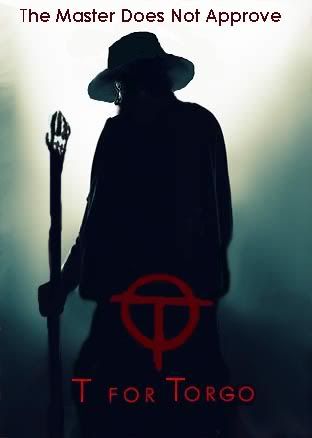What makes a bad story? Or - if it's a different question - what makes a story bad?
I'll admit I enjoy a bad story every now and then, whether it's a book or movie or TV show or whatever. I think a lot of us enjoy a kind of creative schadenfreude, and there's a certain unique enjoyment you can only get by gathering around with your friends to experience something just indescribably, laughably bad.
But, okay, as a writer, I can also try to justify this viewing/reading/listening as a tutorial of What Not To Do. I could learn a lot about filmmaking and storytelling by watching any of this year's Best Picture nominees; but, in theory, I could learn just as much watching something like Zoltan: Hound of Dracula.
Yesterday, as we sat down to re-watch the infamous MST3K classic "Manos" the Hands of Fate, a no-budget '60s "cult horror film" generally recognized as one of the worst (and most unintentionally hilarious) movies ever made, I began to have new and unsettling thoughts. "This movie is awful," I thought to myself, "but did it have to be?" And, following the only genuinely creepy few seconds of the film - a quick gloss over a decrepit mantle, with what looks like the ashen silhouette of a dead man burnt into its relief - I began to have an even more unsettling thought: "could I remake this into a good film?"
There's no doubt that this film is pretty terrible on every level, from the wooden acting to the incompetent shot framing to the almost-nonexistent plot. But there is a plot, as bare-bones as it is; and that plot came from a rough outline, which in turn came from a germ of an idea which surely must have looked far better in writer/director/star Hal Warren's mind than what Manos eventually became. Could that idea have actually borne fruit? What's the difference between a shitty story and a story made shitty?
If I had to summarize the plot of Manos, keeping my opinions out, it would go something like: "A vacationing family spends the night in a desert shack, not knowing they're the prey of a nearby satanic cult". OK. So far, so not bad. A logline like this could pretty easily form the basis of a decent film, and, if the stars align, maybe even a great one. It's not impossible to imagine.
But let's add in some more details. Let's clarify that the cult is essentially one man and his harem of wives, all of whom only come out at night; let's also say that the family is initially cared for - and then betrayed by - a deformed and creepy caretaker named Torgo. And (spoilers!) we admit that the cult will successfully imprison the family, with the wife and daughter (who can't be older than five!) added to the harem, and the husband/protagonist taking up the caretaker position after Torgo apparently dies. Also, the main cultist sleeps outside on a slab of rock while his wives sleep tied to poles (though they seem able to free themselves at any time). The wives also love to wrestle each other for hours at a time. And don't forget the guy wears a black robe-thing with gigantic fucking red hands on it!
See? It's tricky to spot the point of no return.
But there's examples in other media too. Take the relatively-unknown novel The Lost Truth by Mike Pesko. Pesko wrote most of the "military thriller" (?) as a teenager, and was lucky enough to have it printed by a small publisher. Check out some of these highlights:""Come on, men," Fletcher shouted to his hundred soldiers as he ordered ten of them into the air. He directed half of them to take out the two big gunners and the other three to hold the easily vulnerable transport ships in captivity and demand an unconditional surrender."
""Get your ass out of bed," the commander barked with a different timbre than used the last time they talked."
"There was more than one way to capture or kill a foreign military general. If casualties on their side were large compared to your casualties, then you have killed the foreign general. If you took out his capital building, then you have captured him. There were also other miscellaneous ways."

Although we've wanted to turn this into a movie - so faithful to the book that every time we see a map of Dushku (yes, Dushku) it changes from an island to a series of islands to an archipelago to whatever else - I also confess to imagining the possibilities of, you guessed it, remaking the book to see if it could really work. At its base, The Lost Truth is about a man struggling to unite diverse groups of people against an enemy force almost completely indistinguishable from their own.
God, put that way it sounds a lot like Battlestar Galactica, doesn't it? Even moreso when we add the detail that it takes place on a distant planet populated with humans much like us. But let's keep going. Let's add the detail of the enemy forces: the deadly, galaxy-traveling Are (yes, Are) race, who are able to possess humans because they're one-dimensional beings (this couldn't possibly have been an intentional joke), though they never have a larger goal besides victory through warfare. Also, a series of ill-defined neighbor countries who are always at war for generally left-wing reasons such as personal freedoms or democratic voting recounts. And, hey, a lot of sea life died due to an orbit change because the sun doesn't have enough gravity for Dushku anymore. Again, that slippery slope is tough to navigate.
But here's the thing. Despite how Manos and The Lost Truth turned out, there's no reason to think Hal Warren or Mike Pesko couldn't go on to produce competent pieces of work. The creativity is obviously there, even if craftsmanship is lacking. These guys obviously had stories they wanted to tell, and I couldn't fault anyone for that. But what would it have taken to make these works competent? Would they even be recognizable in comparison to what we have now? I wonder if The Lost Truth could have been saved by an editor or writing classes. I wonder if Manos would have prospered with a larger budget (and all the improvements that entails). Would we all be better off? Or are these works actually more important to us as failures, as warnings to future travelers along the road of creativity?
Truth be told, I don't have answers for any of this, aside from "Everything is the way it is" and "Speculation will buy you the greatest mansion you'll never see". I can't think of a single infamously bad work that someone has tried to recreate as an actual good story. It might be a fun experiment for those with the time and inclination, or an unexpected cash cow for a Hollywood that's obsessed with remodeling over new-modeling. 
Yeah. now we're talking.
Monday, March 16, 2009
Dead Rock and Roll, Remodeled
Subscribe to:
Post Comments (Atom)

2 comments:
Do you not consider Battlestar Galactica an infamously bad work that someone has tried to recreate as an actual good story? Or Ocean's 11, perhaps? Those both seem to fit the bill, off the top of my head. Granted, not as bad as Manos or The Lost Truth, but I think there are few who would doubt the cheesiness of either of them.
Good call. I was thinking more total disasters than guilty pleasures, but there's admittedly a thin and subjective line between the two. Ron Moore beat me to it!
Post a Comment